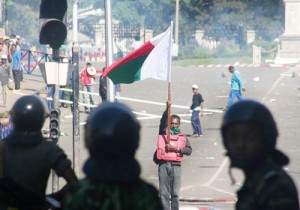Stories about Development from April, 2009
Trinidad and Tobago: Saving the Mangrove
“Is Essar and mangrove destruction the best way forward and is melting steel the best way for a small country with only a few yeas of gas left to develop?”: This Beach Called Life encourages you to sign a petition to save “the Claxton Bay mangrove and the environment in...
Egypt: Cleanliness Day on April 10
We have been paying close attention to the creative ways in which Egyptian bloggers and activists have been using online social networking to rally support for their causes and initiate social and political change. In this post, Marwa Rakha writes about a Facebook campaign by Mostafa Ahmed and more than 4,500 enthusiasts, who joined hands to mark Egypt's first Cleanliness Day on April 10.
Morocco: A New Green Party
The View From Fez announces that a new green party, called the Environment and Sustainable Development Party (Le Parti de l'Environnement et du Développement Durable), has been formed recently in Morocco.
Kazakhstan: A Push for Global Uranium Reserve
Joshua Foust reports that Kazakhstan’s president Nursultan Nazarbayev is continuing his years-long push for a global “bank” for uranium.
Kazakhstan: Railroad politicking
Michael Hancock analyzes the transport policies in the Central Asian region against the background of the Iranian leader's visit to Kazakhstan.
Jordan: Community Work Changing Lives
In a heartwarming story from Jordan, Sha3teely blogs about his local community's efforts to help a visually impaired street vendor. Ebtihal Mahadeen brings us the story.
Indonesia: Lessons from the dam tragedy
Love Ely shares some thoughts on why the Situ Gintung dam collapsed in Indonesia. He also proposes that those who live in disaster-prone areas should prepare for an emergency response system.
Trinidad & Tobago: Facelift
“Quick! Look busy. Obama is coming. Hide away anything that would suggest that we have screwed up priorities and should be spending $600 million doing the things we are paying lip service to in the Summit of the Americas declaration ”: Attillah Springer wishes Trinidad and Tobago would get its priorities...
Life in East Timor
Loro Horta writes about the social and economic situation of East Timor. Horta writes: “While poverty has been part of daily life for the majority, it now exists side by side with small pockets of scandalous affluence resulting from the oil bonanza.”
Taiwan: Preserving memories of Losheng
The action of saving the Losheng Sanatorium is not as successful as many people hoped. Many buildings in the sanatorium are being taken apart and taken away. However, many people keep caring about the people who have spent most of their life in the sanatorium. The Japanese frottage artist, Masao Okabe heard the story about the Losheng Sanatorium, and he decided to hold a frottage workshop to help people preserve their memory of Losheng.
Kazakhstan: Earth Hour on Kazakh blogosphere
Askhat reviews reactions of the Kazakh-language blogosphere to “Earth Hour”, a symbolic protest action against global warming.
Australia: Indigenous Rights Declaration Approved
Australia’s government has endorsed the United Nations Declaration on the Rights of Indigenous Peoples, a year and a half after voting – along with Canada, New Zealand, and the United States – against the September 2007 document. Reform Wollongong City Council, a blog from Australia, writes: On Friday 3 April...
Global Job Losses and Returning Migrant Workers
This post focuses on the stories of the unemployed and migrant workers who are returning home to their countries. Job layoffs are perceived by most people as the primary and most recognizable indicator of the global economic recession. How has unemployment affected individuals around the world? In what ways the reverse migration of workers creating problems for developing nations?
Africa: Bob Geldof and two African bloggers
Two African bloggers, Sokari Ekine and Daudi Were, were interviewed together with Bob Geldoft on the under representation of Africa at the G20 summit.
Nigeria: On rebranding Nigeria
Chxta discusses the idea of rebranding Nigeria, “Even those who want to rebuild Nigeria need to learn the most basic of lessons, punctuality.”
Sudan: Surviving without the help of NGOs
On March 4th, the International Criminal Court (ICC) issued an arrest warrant for President Omar Hassan al-Bashir of Sudan. In retaliation, 13 NGO’s were banished from the country the day after, a number that rose to 16 within the week. As a result, a handful of projects have halted operations: those offering drinkable water supply, food distribution, health care and teaching systems among others.
Trinidad & Tobago: On the Waterfront
Trinidad-based blogger Haveworld posts photos of Port of Spain's newly developed waterfront.
Causes and Consequences of the Coup in Madagascar
After the power transfer that took place on March 17th in Madagascar, unrest is still growing strong in the island nation. 15,000 protested against the coup Saturday for the sixth consecutive day and have been tear-gassed by armed forces for three days straight. Sunday, civil protesters were shot at and wounded by police forces, resulting in 34 wounded and a few unaccounted for. Lova Rakotomalala reviews the political and economic causes of the power struggle and the consequences of the coup for the Malagasy people.




